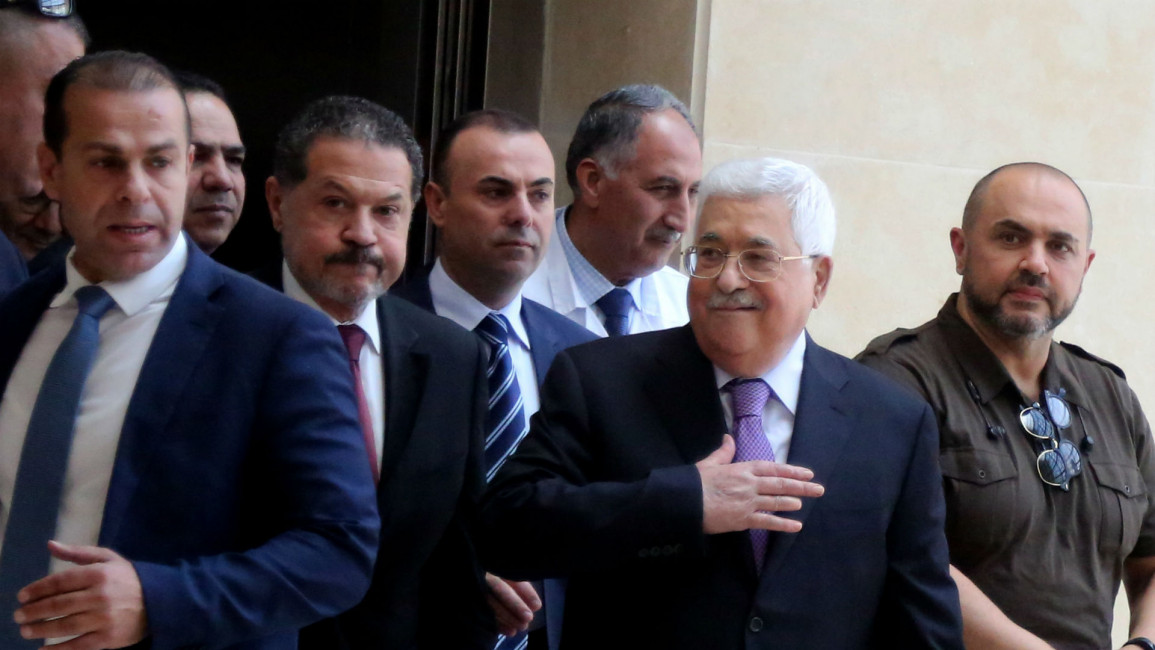Palestinian courts 'losing independence' after new Abbas decree
The Palestinian minister of justice, Mohammad Shalaldeh, has expressed in private concerns on the latest law-by-decrees issued by president Mahmoud Abbas regarding the judiciary's independence, Palestinian media reported on Monday.
According to reports, Shalaldeh said that his ministry has "lost its power" over the Palestinian court system, as a result of laws-by-decree expanding up the jurisdiction of the supreme judicial council.
The reports came a few days after the Palestinian president issued a new law-by-decree to form new administrative courts in Palestine. Earlier in January, Abbas issued four laws-by-decree, including amendments to the penal procedures law.
The Palestinian bar association announced last week a strike by lawyers to demand a stop on the enforcement of the latest laws-by-decree. The strike was suspended Sunday after promises were made by representatives of the Palestinian government to suspend the new laws.
The supreme judicial council was given enhanced powers over Palestinian courts through a law-by-decree issued by Abbas in 2019, which established a provisional judicial council. The then-provisional judicial council ordered a large number of judges to retire, in turn appointing new judges, a move that provoked major criticism by several Palestinian civil society organizations.
Ashraf Abu Hayeh, a legal expert at the Palestinian legal organization Al-Haq told The New Arab that "the main issue with these laws-by-decre is that they make changes that are supposed to be exclusive to the judicial brach, which is a clear interference by the government with the judicial's independence."
"The latest decrees are a continuation of a series of measures since 2018, which have tightened the executive branch's grip over all powers," pointed out Abu Hayeh. "The Palestinian judicial system has lost its independence."
“Mr. President, The Executive Authority’s interference with judicial affairs has contributed to the deterioration in the judiciary and the decline of citizens’ trust in the judicial system” #alHaq_letter_to_the_Palestinian_President #Rule_of_law #Separation_of_powers pic.twitter.com/Tqq5SqWKRZ
— Al-Haq الحق (@alhaq_org) January 27, 2021
In 2018, the Palestinian constitutional court officially dissolved the Palestinian legislative council, the law-making body for Palestinians in the West Bank and the Gaza Strip. The council had been unfunctional since 2007.
In December 2020, three laws-by-decree made the transitory supreme judicial council permanent, and further modified the judicial code. In March 2021, another law-by-decree ruled that non-profit organizations should submit their reports and budgets directly to the Palestinian government, amidst warnings of increasing authoritarianism.
Law-making in the Palestinian territory, in theory, is the job of the legislative council. Since the Palestinian split between Fatah and Hamas in 2007, and following by the arrest of a large number of elected Palestinian lawmakers by Israel, laws became issued by presidential decrees.
In 2018, the Palestinian government issued, in coordination with legal and civil organizations, a "national policies agenda" that states that all law-making had to be discussed with civil society.
According to the Palestinian constitutional law, all laws issued by decree have to be reviewed and approved by a legislative council after it is elected.
Palestinians were scheduled to elect a new council in May of last year, after more than 15 years. But the elections were suspended one month prior to it being carried by the Palestinian president, who refused to hold elections if Israel does not allow Palestinians in Jerusalem to vote.



